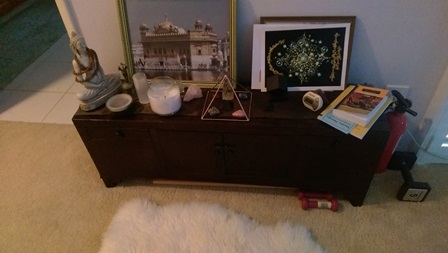
Just as someone may have a personal work-out gym in their own home, it is not unusual for a client to have or desire to have a meditation space. Sometimes the meditation space is informally put together and as simple as an altar in a room which has other functions (bedroom, living room, etc.) I have also seen clients dedicate an entire room, just for the purpose of meditation, yoga, or prayer.
There are no hard and fast rules regarding where to place an altar or where to meditate and sometimes practicality dictates, when people live in tiny apartments with little choice of where they can carve out that sacred spot. But the following are some guidelines, based on my experiences as well as some input from fellow feng shui practitioners:
• Ideally you should meditate in your “Fu Bi” location and/or direction. This is your most restful, peaceful direction based on your birth date. As an example, a man born in 1951 would identify with southeast as his “Fu Bi direction.
• This Fu Bi direction is going to wind up in a particular room or area of your house that is unique to the orientation of your living space. Obviously, if it turns out to be your kitchen, then there needs to be some alternative, such as the Fu Bi sector within your bedroom. Individual rooms can be micro-managed as smaller versions of the house or apartment as a whole.
• If you have the type of career where it is important to be a spiritual inspiration to others, like a teacher, philosopher, or coach–then you may want to meditate in an area that contains the “4″ Xun star energy of your house. Again, this will be in a location of your house specific to when it was built and its compass orientation. ***If you don’t know where the “4″ energy shows up in your house, then by all means contact me for a consultation.
• Another good area to meditate in your house is where the “8″ Prosperity Star is. This is consistent with conversations I have had with other consultants, that you absolutely do not want to meditate in a negative area of your house. Choose the most positive sectors and choose your goals.
Years ago, there was one feng shui book that implied you could transform a negative space into a positive space by making it your meditation room. While there may be some truth to that, why swim upstream or work harder for your peace of mind than you have to?
• You may be surprised to know that running water (like a fountain) is not necessarily a good thing to have in a meditation room because it may be too distracting. So even though circulating water makes most of us feel great, it has a yang quality to it that may not be conducive to a yin-type activity like meditation.
• Place in your meditation space whatever symbols or objects that are meaningful and uplifting to you personally. Do not feel obligated to use symbols or art outside of your own religion or cultural background. I mention this because if you are Christian or Jewish for example, Feng Shui principles do not insist you have images of Buddha all around.
My own altar is relatively simple with a picture of my son, some healing stones, and a few other accessories for meditation like a timer, some malas and a candle. Other objects of inspiration make guest appearances now and then if I want to focus on a particular area of my life.
• In some religions it is considered inappropriate to place holy books in the same room where there could be sexual activity. You may be satisfied with a simple screen to partition off your meditation space from other worldly functions.
• You should be comfortable in your meditation space and be able to control the temperature, lighting, and sound.
I have noticed a distinct difference in the energy of homes where people meditate. (And I never claim to be that subtle or sensitive.) The air or qi has a cleaner, higher vibration, as if there were an air-purifier in use. This vibration makes the home feel more relaxed. It amplifies the good feng shui in the house. Although it is only loosely related to feng shui, the continuous playing of mantras can act as a partial space-clearing remedy to help bring more harmonious vibrations into the house.
And just like the brain, which acts as the control tower for the body, your meditation room has the potential to be a critically important part of your house and contribute to your whole state of well-being.
Author: Kartar Diamond
Company: Feng Shui Solutions (R)
From the Feng Shui Health & Personal Matters Blog Series
